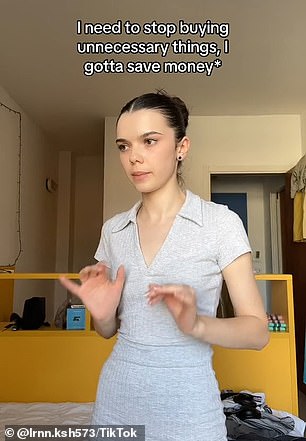Are YOU guilty of ‘split brain spending’? Expert explains why we’re obsessed with saving money on basics like travel but WILL splurge on booze and clothes
Are you guilty of ‘split brain spending’? Expert Explains Why We’re Obsessed With Saving Money On Basics Like Travel, But WILL Spend On Booze And Clothes
If you’ve ever been obsessed with searching for the cheapest flights before spending all your money on inflight booze, you may be guilty of “split brain spending.”
That’s the term used by experts to explain why we enjoy spending money on some things but hate paying for other things.
The phrase refers to the difference between the right and left sides of the brain, with the former being responsible for our creativity and impulses, while the latter is more logical and analytical.
Buying behavior is increasingly being pulled in both directions as households try to cut radically amid rampant inflation but fail to curb their spending.
Financial therapist Heather Pulier told DailyMail.com, “Our brains have the ability to categorize our finances into boxes that don’t really make sense.
Financial therapist Heather Pulier said individuals tend to be frugal as numbers show consumer spending has remained high despite rampant inflation and red-hot interest rates
‘I have one client who has a good income and can afford to hire help for childcare.
“This is an expense that makes sense and would make her life easier. But she couldn’t even think about spending that money, and yet she will spend the money on a new dress.’
She added: “We see it everywhere. Even Kate Middleton will be frugal with her clothes and still travel the world with private security. We choose our austerity.’
The trend is prevalent among Gen Z on TikTok, who regularly use the social media app to share their impulse buys.
This week, James Knightley, ING’s chief international economist, warned that Americans were dangerously close to maxing out their credit cards.
A July personal spending report from the bank found that personal spending was up 0.8 percent since the previous month.
This is despite households struggling with the highest interest rates in 22 years as the Fed rate now hovers between 5.25 and 5 percent.
In a blog postKnightley described the trend as “unsustainable,” adding that “credit and borrowing costs are the highest since records began in 1972, so there’s going to be a lot of pain there.”


Experts say spending is increasingly being pulled in both directions as households try to cut radically amid rampant inflation but fail to stem spending. Generation Z regularly uses TikTok to share their impulse buys
But companies rely on customers’ split-brain approach to spending.
It emerged this week that budget airline Allegiant Air had begun selling shots of Johnnie Walker Blue Label Whiskey for $35 each. It’s only $3 less than the cost of the cheapest flight: a $38 one-way ticket between Las Vegas and Phoenix.
Pulier said, “In some ways, we’re making finding airline tickets a game. There are so many comparison sites out there that we can get competitive in finding the best deal.
We also book flights in advance. When spending big, we tend to prioritize spending money on things that will bring us immediate joy and comfort.”
“But when it comes to money, a cocktail is the last thing we need because alcohol relaxes our attitude towards spending.”

It emerged this week that budget airline Allegiant Air had started selling shots of Johnnie Walker Blue Label Whiskey for $35 each
Pulier advises people to leave the house in cash if they want to avoid overspending.
She said, “If you want to spend $500 on a dress, try spending that on cash.”
“Even if you are still happy to spend the money, you will feel the significance of the purchase much more if you take money out of it and physically hand it over.
“Credit cards have made it much easier for us to spend money without realizing it.”
Her comments come after US credit card debt climbed to $1 trillion for the first time in history.
Data from the Atlanta Federal Reserve shows that credit card balances increased by $45 billion in the second quarter of the year.
Experts called the amount “mind-boggling,” with figures also revealing credit card delinquencies had reached an 11-year high.
